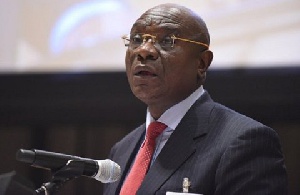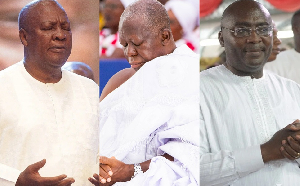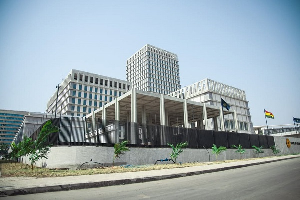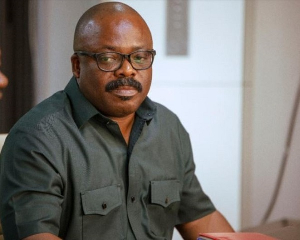By Cameron Duodu
Perhaps I should not have been surprised when I heard that the Speaker of the National Assembly, The Right Honourable Doe Adjaho, had disallowed the Motion the Minority wanted to present to the House, asking it to investigate reports that President John Mahama had received a ford Expedition SUV as a “gift” from a Burkinabe contractor. The contractor subsequently obtained some contracts from the Government of Ghana, and so, the “gift” can be considered a “bribe”.
I should not have been surprised at Adjahoe’s action because the Government of which he is a member (he was put in the job of Speaker of the Legislature by the Majority NDC, which is in power at the executive level as well as in the Legislature) is so notorious for flouting normal rules with impunity that it is almost naïve to expect it to do anything else.
Indeed, Mr Adjaho had set a precedent for himself in “impunity” by acting in precisely the same manner, over the sale of Merchant Bank to a company called Fortiz in 2014. But even though in blocking Parliamentary scrutiny of the sale of Merchant Bank to Fortiz, Mr Adjaho acted ultra vires, (that is, he acted “beyond the powers of his office”) he, at least, had the fig leaf of the sub judice rule to cover his patently partisan act.
The sub judice rule, you see, may be abused by clever lawyers, who rush to file a writ in court in an attempt to gag both the media (and in this case, even Parliament) when they realise that embarrassing disclosures might ensue from an open discussion of a matter – especially one relating to a dubious business deal.
In the Mahama/Ford car matter, however, the issue is not even before a court! So, in preventing Parliament – which has so much power that a popular adage says it “can do anything except change a man into a woman!”) – Mr Adjaho has dealt two deadly blows to Ghana’s 1992 Constitution: (1) he has unilaterally upgraded the status of the Commission on Human Rights and Administrative Justice (CHRAJ) to full judicial status, in direct contravention to the Constitution and (2) he has thereby unilaterally abolished the power of the Parliament of Ghana given to it by the people of Ghana!
This is unacceptable, for in the very first words of the Constitution, it is stated that:
QUOTE: “The Sovereignty of Ghana resides in the people of Ghana in whose name and for whose welfare the powers of government are to be exercised in the manner and within the limits laid down in this Constitution.” UNQUOTE
In other words, SOVEREIGNTY RESIDES IN THE PEOPLE, AND THEREBY, THEIR ELECTED REPRESENTATIVES; i.e. PARLIAMENT!
Indeed, CHRAJ would be the first body to express shock at the way Mr Adjahoe has used a CHRAJ investigation to block an investigation by Parliament. For on its own webpage, the CHRAJ acknowledges unambiguously that:
QUOTE: The Commission is not a judicial body and cannot review decisions that have previously been decided by a competent court. UNQUOTE
So, if the CHRAJ does not consider itself a competent court, where did Adjahoe get the idea that a CHRAJ investigation can prevent Parliamentary scrutiny? Who gave Mr Adjahoe the power to clothe the proceedings of the CHRAJ with the mantle of sub judice? (by the way, the sub judice principle is, itself, under attack, on the grounds that no judge worth his/her salt would take the slightest notice of anything said elsewhere about a case before him or her, and on which no evidence adduced before the court.)
I have to remind Mr Doe Adjaho – again – that the position of Speaker of the National Assembly is not one to be dignified only with “silk hoses and patent shoes.” It is a position of great trust. To be given the power to oversee the propriety in what is said by the elected representatives of the people on behalf of their electors, is to be placed in charge of the most important right that any people can possess – freedom of speech.
If I were an MP, I would go straight to the Supreme Court to seek an interpretation of the notion that if the CHRAJ is seized of a matter, then Parliament is prevented from delving into it. Indeed, if we were in a country where people cared enough about their constitutional rights, a public appeal would be launched immediately asking for donations to finance a suit at the Supreme Court to declare the Speaker’s assault on democracy unlawful.
May I remind Mr Adjaho (and the Clerk of Parliament, whose technocratic name Mr Adjaho ingloriously invoked in making his outrageous and scandalous ruling) of what the website of the House of Commons – the location from which the mystifying notion of a “Speaker” who does not “speak” in debates originated – has to say about the office of Speaker:
QUOTE: “The Speaker is the chief officer and highest authority of the House of Commons and must remain politically impartial at all times. [emphasis added]….The Speaker keeps order and calls MPs to speak.
Speakers still stand in general elections. [But] They are generally unopposed by the major political parties, who will not field a candidate in the Speaker’s constituency. [emphasis added] During a general election, Speakers do not campaign on any political issues [emphasis added]. UNQUOTE
It is the enforcement of rules like the above that enables the British to have confidence in the integrity of their high officials. Even so, they are not fully satisfied with their democracy, and keep tinkering with it. If our democracy is to last, we must force our public office-holders to exhibit the same integrity as their British counterparts do.
In other words, Mr Speaker, we don’t call you ‘Panin’ (Elder) for nothing (as our talking drums would tell you, if you knew how to listen to them!).
Opinions of Tuesday, 6 September 2016
Columnist: Cameron Duodu















